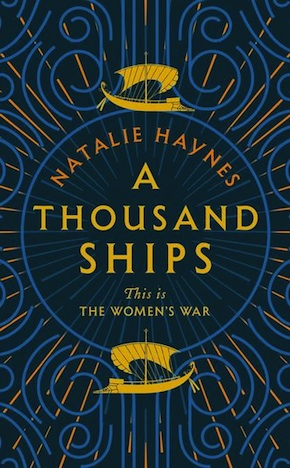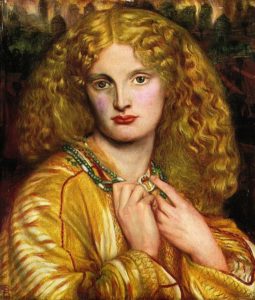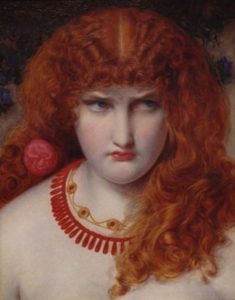Outrages
by Mika Provata-CarloneIn her latest engagement with the classical tradition, a self-proclaimed radical rewriting of the story behind the Homeric epics, Natalie Haynes is openly outraged and angry. Indignant and righteous, she is a strong, vocal, almost virago-like warrior with a declaredly urgent, even vital cause: to resurrect and reinstate the ancient women in the attic, to summon with one barbaric yawp, a mighty battle cry, the angels and demons in the house – and much further beyond.
A Thousand Ships makes a feisty pitch to redress a long-denied feminine presence that Haynes maintains applies to her chosen heroines as well. Her novel is especially, specifically and proudly all about the female voices that, in Haynes’ argument, have been stifled for millennia, by Homer, by the tragedians, by contemporary or later historians, by a very long line of past-hunters – classicists, ethnologists and archaeologists – all part of a decidedly male conspiracy to suppress female agency, trauma, primacy.
In fact, A Thousand Ships could well have started with an invocation, always to that much taxed, displaced, equally irate and exhausted epic muse, to “sing of the rage, oh goddess, the rage of all those women, of the ire welling up for their suffering and predicament”; or, again, it could start (it almost does start) with a resolute and highly ambiguous Virgilian ‘I’: “I sing of war and the women”, of the women crushed, erased and driven to extinction by all those pesky men.
Haynes sets out to put all these wrongs to right. She has carefully chosen her dramatis personae, and with lush relish proceeds to conjure up vignette after vignette of female life and existence under Trojan and Greek male domination. Holding the thread tautly together is her Calliope, a creature that seems to have sprung out of a Norse saga, bartering and moaning, crouching, ever ready to pounce, like a tiny, highly venomous spider in the corner, plotting and pouting. Alternating shorter or longer chapters that are first or third person narratives of her silenced heroines, Haynes opts for what seems to be a stream-of-consciousness strategy. This usefully allows her to ignore the need for plot continuity, transitions or a commitment to a linear development of argument and purpose. It also clears the ground for a syncretic and idiosyncratic selection of elements from the epic cycle, the exegetical tradition and the various strands of scholarship that have evolved in the not so negligible span of time since Homer sang his poems or since Peisistratus commissioned their official copying and recording, thus creating a canonical text that would give birth to the most uncanonical and maverick engagement by generations of poets and readers to come. This looser, more improvisational, tactically spontaneous authorial trope also gives Haynes the freedom to blur fact and fiction, evidence and figment, argument and what seems at times as demagogic rhetoric.
It is a pity that in an age when we seem to be so enthralled by the classics and especially by Homer’s heroes and their stories, we also seem so very reluctant to be honest about what they actually mean.”
The basis for wanting to confront the Homeric story is a particular take on the hermeneutics of the poems’ tradition, reception, or intentionality: “Homer’s Iliad is (rightly) regarded as one of the great foundational texts on war and warriors, men and masculinity,” Haynes purports, without offering any supporting evidence other than her own claim. The analyses of Dale Sinos, Seth Bernadette, Robert Lamberton or Andrew Ford might have offered her much more radical, cogent insight. It is a pity that in an age when we seem to be so enthralled by the classics and especially by Homer’s heroes and their stories (the British Museum is preparing a major exhibition on Troy, an impressive number of publishers have launched several series of volumes on how the ancient authors or the experiences of antiquity can change or illuminate your life, politicians of greater or lesser credibility choose to make their bids for popular admiration through classically inspired flourishes and homages), we also seem so very reluctant to be honest about what they actually mean. We speak a great deal about the classics, referencing what we think are familiar topoi, but do we actually read the words themselves? Do we go back to the original stories to test them for their own real value? Or do we rather project upon an unresisting past our own fallible egos, moral and sociocultural failings and fixations?
More often than not, our familiarity with the classical tradition is second-hand, hearsay, or several times removed, and it seems that Haynes has sadly not been able to resist the temptation of rehashing stereotypes recycled almost beyond recognition. She has the best part of academia against her, as well as fellow writers such as Joyce, Walcott, Yourcenar, Cavafy, Shakespeare, Christa Wolf, Giraudoux, Toni Harrison – the list is rather reassuringly long – who have seen Homer’s epics in particular as an incisive anatomy of human nature (both male and female), a scathing analysis of the futility, brutality, insanity of war, the despair and devastation of all who are embroiled in it, a staggering first paradigm of the need to address war-related PTSD syndromes and their effects on society and the human psyche.
Homer’s epics are not only among the finest, most vital and gripping examples of poetry humankind has ever produced, they are also treatises on political, social, cultural and ethical education, and they were invariably and crucially seen as such by both their detractors and admirers. More than a blind singer, an entertainer for hire by kings and their court, or a minstrel charming the hearts of the simple folk in the marketplace, Homer is explicitly engaged not only in the politics of his age, but in political theory as a way of forging a human, civic society. Through the discursive analysis of the ethics and cultural requirements of both war and peace, Homer emerges as a legislator in a pre-textual, pre-constitutional world, and as an interpreter of the world of mankind, as well as of the divine cosmos of the gods. He is shrewd, methodical, conscious of the power of the orally transmitted word to create a tradition of humanity. The famous contests with Hesiod were not simply competitions in poetic prowess and virtuosity. They were monumental junctures of human judgement as to the course that society and individuals should choose, as to the types of relationship with the human and the divine, the friend and the foe, with men and women, the material and the natural world, the life of the mind and the life of action – essentially the I and the Thou – that were most desirable and conducive to a sustainable and sustaining state of civilisation. Homer is explicit in his judgement of tyrants, hubristic heroes, flippant gods or goddesses, cheating husbands or philandering wives. The famous shield of Achilles is, arguably, comparable in philosophic poignancy to more analytical essays such as Plato’s Republic or Augustine’s City of God, Dante’s De Monarchia or Machiavelli’s The Prince.
Achilles is wrong, humanly flawed throughout, even if his reasons are right. And this is precisely Homer’s point. That one cannot fight the aggression against one’s own humanity from within the ethical paradigm of war.”
Homer is sharp-eyed about the fine line between justified human outrage and blind, unjustifiable, savage fury. Achilles’ anger is a flawed reaction to Agamemnon’s bullying and abuse of power; the killing and despoiling of Hector is a hubristic, excessive demonstration of pain at the loss of a friend; Hector’s own killing of Patroclus was an act of brutal one-upmanship; Achilles is wrong, humanly flawed throughout, even if his reasons are right. And this is precisely Homer’s point. That one cannot fight the aggression against one’s own humanity from within the ethical paradigm of war. One can fight, like Hector or Odysseus, because one cannot do otherwise, yet war for Homer is without exception wrong, an aberration, a deviation and a crime. This is the cameo that Hephaestus places at the very heart of the extraordinary design of the shield Thetis begs him to forge for her son. Achilles dies not for glory, but because he cannot ignore his duty to a friend. The last conversation with Thetis, the words of Briseis and her dreams of a home in Greece, his definition of her as “that small part of life allotted to me that I love”, expose the tragedy, not the vainglory of Achilles, just as Astyanax cringing away from his father still wearing his helmet exposes the tragedy of Hector.
The Iliad’s tremendous force comes precisely from Homer’s genius in creating a tableau of desperate humanity – through his harrowing descriptions of duels on the battlefield, his choice of damning epithets when it comes to ruthless force, his superbly chosen portraits of rare humanity, fragility and pain. He is the poet not of the Greeks, not of the Trojans, but of a misguided, expiring mankind, insanely set upon its own destruction. The Greeks and the Trojans, in fact, are mirror images to one another, cultures so similar that the very idea of a conflict to death between them only accentuates the utter sense of loss, futility, catastrophe and despair. The war at Troy is not a war between East and West. It is an auto-da-fé, a self-inflicted wound, a motif that runs throughout the poem both symbolically and narratively. The Odyssey is Homer’s process of healing. Any of the other warlords who made it home swiftly, directly, unreflectingly, does not fare very happily. From the trance-like aura at Menelaus’ house, the mouldy limbo of Nestor’s palace or the bloody quagmire of ire and revenge permeating Agamemnon’s kingdom, Homer is the first to diagnose the post-war condition of warriors as the symptom of a mental and social disease. Odysseus’ peregrinations, for all that they make a very fine, ripping yarn, are in fact stages of humanisation, chambers of decompression and rehabilitation. This is why the place that is everything Odysseus could have wished for, the kingdom of the Phaeacians, will not do; only ragged, beloved, old and insignificant Ithaca will suffice.
Homer is particularly keen to showcase what is best in the human psyche in the simplest, most accessible, most vital terms: a caring mother who must watch her son going to his death, friends torn apart by the sense of duty and the feeling of crippling injustice, a fully enfranchised loyal wife who is her husband’s equal (and both Greek and Trojan characters fit such descriptions in the two epics), the eradication of separatist, segregationist, polarising differences, as in the meetings between Achilles and Priam, Odysseus and Eumaeus, Athena’s intervention that stops the cycle of retribution in favour of dike, reconstruction, rehumanisation (a theme picked up later by the Oresteia). For Homer, the only criterion for belonging to the human category is nobility of the soul, and this is the kleos that ultimately emerges as the truest, most perfect glory.
In her effort to create a Troy narrative for the Everywoman of the 21st century, Haynes misses a tremendous opportunity of fleshing out everything that is already part of Homer’s story or of the plays that make up the tragic and epic corpus. Keen to weave together the terrible with the beautiful, in fact and in language, to be a radical, controversial, antipatriarchal female voice, Haynes sadly compromises her integrity as a reader and as a student of the classical tradition as it really was. Perhaps we do need a new history, a new historian of the Trojan cycle, a new epic tradition and literary or cultural lineage. Yet in order for that to be truly original and inspirational, it inevitably has to go back to the origins of narrative and time. Haynes evinces the same shortcomings as Barry Strauss, whose revisionist the Trojan War: A New History (2007) seems to be subtly woven into the backbone of her own story: she settles for a popular angle, tailored and resized to fit extraneous agendas, for rhetorical glamour rather than real, traumatised, devastated voices.
Her female voices, in their effort to be groundbreakers, Boudicas avant la lettre, often sound condescendingly housewifey: Trojan wives mutter, all women are compliant, regurgitating what the ‘wiser’ males proclaim as the dominant narratives. Their voices reference more village-shop gossip than embody an emerging female conscience, a female soul finally finding the words to say it. In the effort to foreground the women, every sense of broader landscape, perspective, narrative or psychological context almost invariably disappears. Haynes’ Greeks are Virgilian: ignoble, primitive, perfidious, and the Trojans are equally anticlimactic: they evince the pettiness of a small-minded, insular, heavily nationalistic bourgeoisie. Descriptions are laboured, florid, intensely rigged towards sensationalism and rather questionable sensuality (one example is the portrayal of Penthesilea, stretching “long limbs” as she wakes up, tying sandal straps “around her finely muscled calves”, feeling a tingle of jouissance as the paws of the leopard skin she sports “stroked the front of her thighs as she moved”). A Thousand Ships in this context is part romance, part manifesto – and Haynes lacks Virgil’s poetic skill or Ovid’s daringly bawdy audacity to endow either with an aesthetic vision or at least with a sense of engaged transcendence – or even transgression.
The end of the Iliad is a dirge for all heroes, against the ravages of war, and the name of the poem is revealing. Not a Greek hero’s poem, but a Greek poem about a Trojan city [and] a terrible war.”
Homer closed the Iliad with the glorious funeral, not of a Greek hero, but of a Trojan. Achilles does not die in the Iliad, yet he is destroyed. He has lost his best friend, his humanity, the hope of ever returning home with Briseis or even of staying alive. The poem does not even end with a victory for the Greeks or the destruction of Troy. It ends with the starkest, most arresting illustration and dramatisation of the human cost of war, and more importantly for both battling sides. The end of the Iliad is an ode to Hector and the Trojans, a lament for Achilles’ lost humanity, a funeral for three heroes, in fact, each the mirror of the others: Patroclus, Hector and Achilles. The end of the Iliad is a dirge for all heroes, against the ravages of war, and the name of the poem is revealing. Not a Greek hero’s poem, but a Greek poem about a Trojan city, or, better still, about the topos of a terrible war.
Haynes decides this is a weak, inadequate ending to things. It does not have enough oomph, tit for tat, a meaty settling of scores. Her rewriting resonates with sentiments of resentment, retribution, adversarialism, a feeling of ‘long enough’ – a familiar topos for classicists, since this is an exact translation of the words iam satis running through Virgil’s work – and the Roman precept of bellum iustum. It is this feeling that makes her heroines so unsettling, so problematic both psychologically and contextually. Hecuba is supercilious, antagonistic, dismissive, not only of Helen, but also of Cassandra and Andromache. Penelope is given pride of place as a foil character to Haynes’ rather unsavoury Odysseus, a particularly rancorous, bitter wife, a scheming epistolographer, bent upon naming and shaming her husband throughout his long journey of return. The emphasis is always on a wounded ego, a petulant, combative or sulking female caricature, rather than on a devastated human being, and this, again, is a regrettable failing.
It is not a pleasing task to write a critical review, especially when the thematic opportunity, the literary potential might have been so great. Haynes has the ambition to stand as a new voice for the classical world, especially the female world of antiquity. If she can find the discipline, the clarity and the distance to write with true originality, she certainly has the momentum to produce a future work worth much good attention as well as readerly and critical appreciation.
 Natalie Haynes is a writer and broadcaster and the author of The Children of Jocasta, The Amber Fury, which was shortlisted for the Scottish Crime Book of the Year award, and The Ancient Guide to Modern Life. She has written and presented two series of the BBC Radio 4 show Natalie Haynes Stands Up for the Classics. In 2015 she was awarded the Classical Association Prize for her work in bringing Classics to a wider audience. A Thousand Ships is published in hardback and audiobook by Mantle.
Natalie Haynes is a writer and broadcaster and the author of The Children of Jocasta, The Amber Fury, which was shortlisted for the Scottish Crime Book of the Year award, and The Ancient Guide to Modern Life. She has written and presented two series of the BBC Radio 4 show Natalie Haynes Stands Up for the Classics. In 2015 she was awarded the Classical Association Prize for her work in bringing Classics to a wider audience. A Thousand Ships is published in hardback and audiobook by Mantle.
Read more
nataliehaynes.com
Author portrait © James Betts
Mika Provata-Carlone is an independent scholar, translator, editor and illustrator, and a contributing editor to Bookanista. She has a doctorate from Princeton University and lives and works in London.




